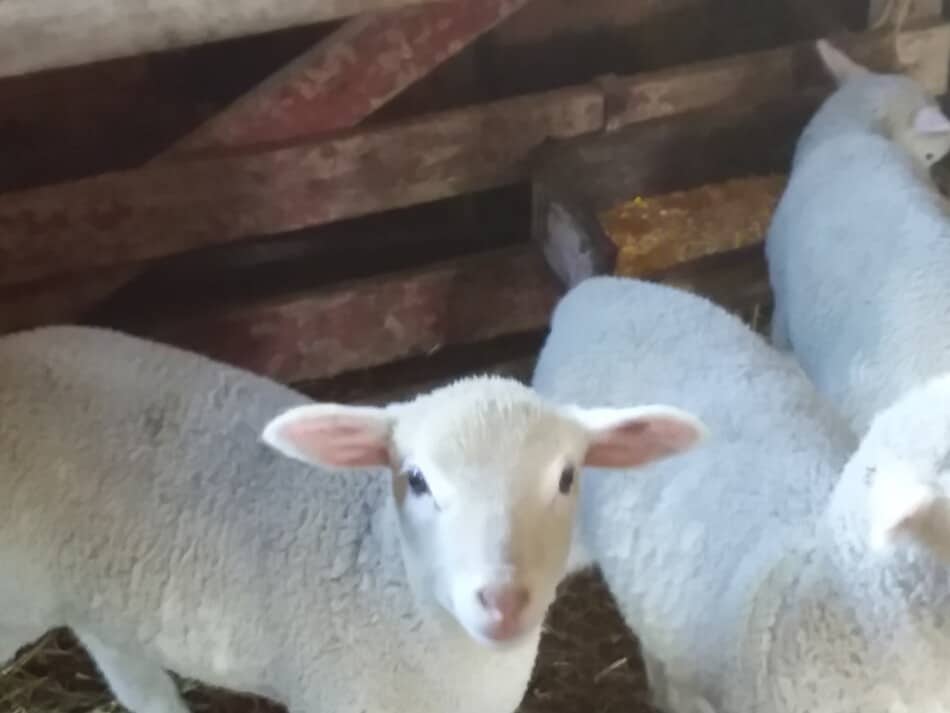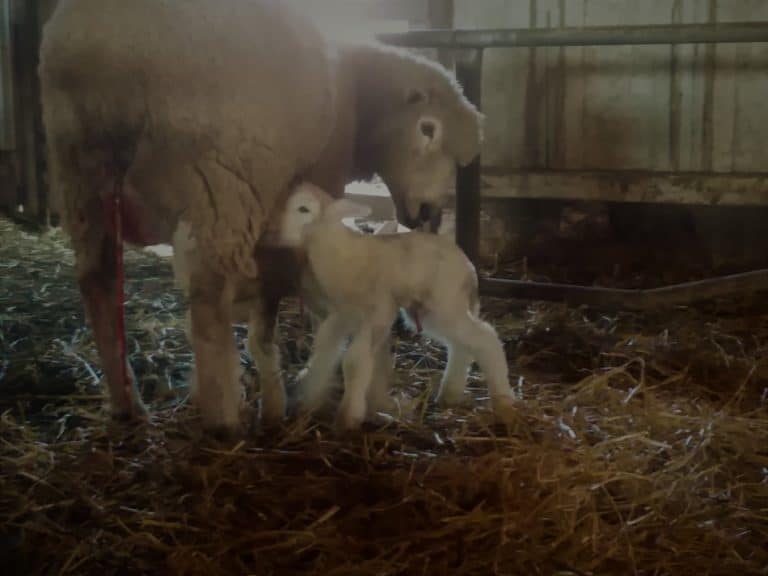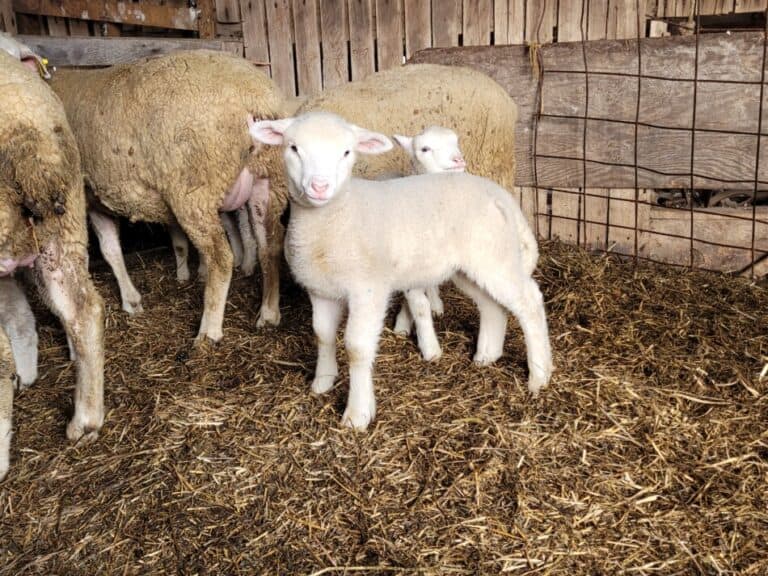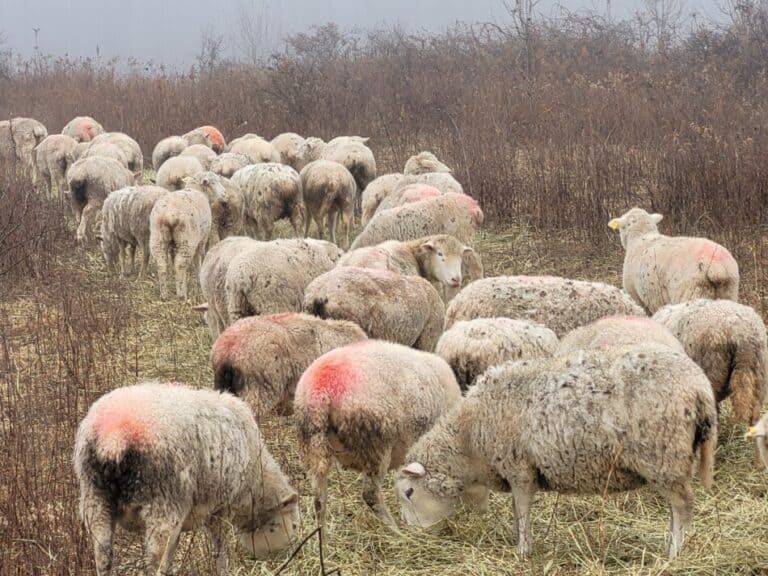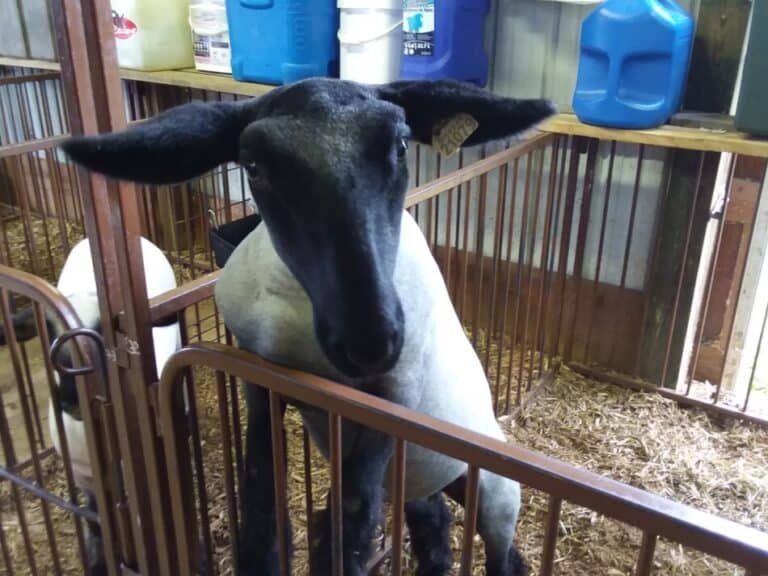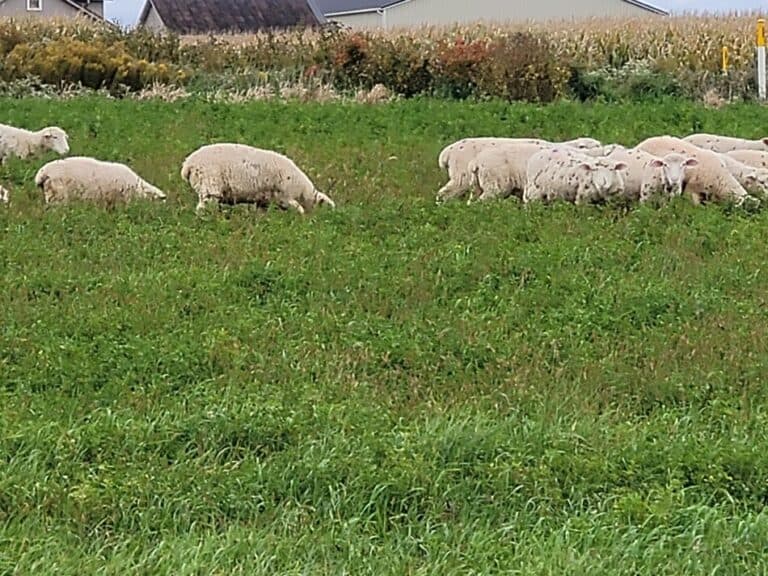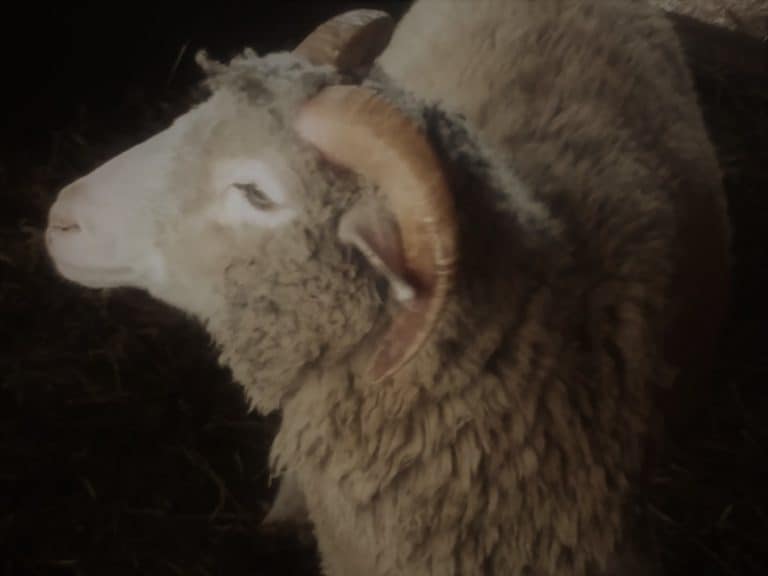Pros And Cons Of Raising Sheep
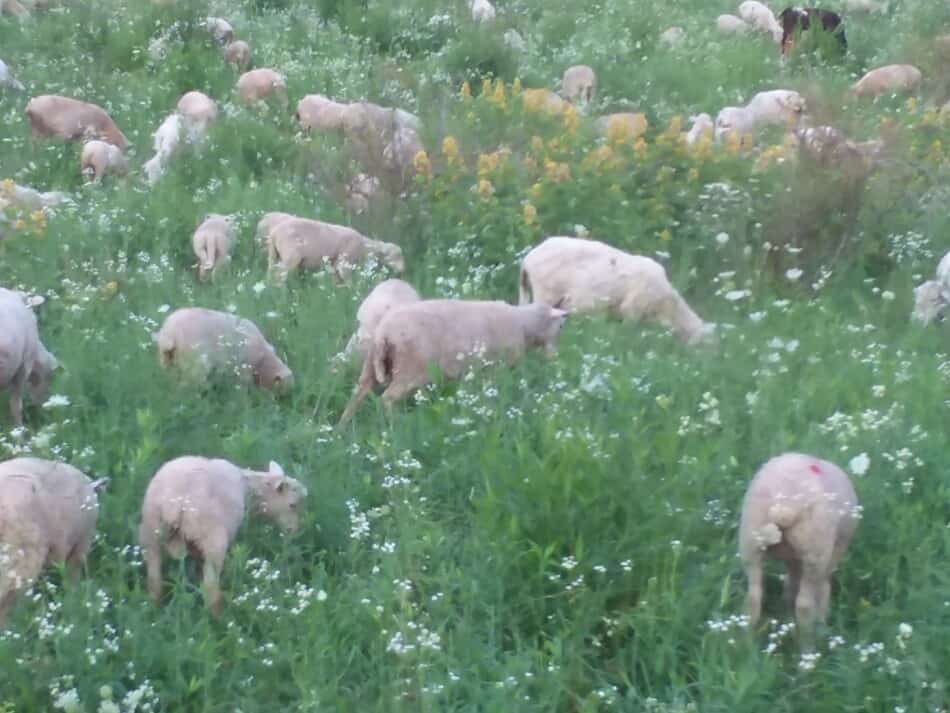
Thinking about getting into sheep but want a bit more information on what raising sheep is really like? I’m talking about the full scoop, both good and bad, from someone who knows about sheep. I can help you here.
We raise sheep for a living and enjoy doing so, most days are great, a few, not so much! Here’s an overview, as we see it, of the pros and cons of raising sheep.
Pros of raising sheep outnumber the cons
Overall, the pros of raising sheep outnumber the cons. But, sheep are certainly not perfect for every person or every situation.
Are sheep a good fit for you?
Sheep can be a great animal to raise for someone who:
- likes sheep
- has grass (since feed is the largest expense for keeping any livestock)
- is willing to spend time each day observing the flock
Would be flock owners who may not be a great fit for raising sheep are people who:
- really don’t like sheep (just want the money)
- are extremely limited on space (they’ll have to buy a lot of hay which increases costs)
- who are unable to spend time each day observing the sheep
Sheep have low feed requirements
Sheep, since they are smaller bodied, need less feed per day than other animals that also eat grass. This means you are buying less hay or using up less pasture per day to feed a few sheep than you would be to feed a few cattle.
Backyard Sheep is an article I wrote to get people thinking about using their yards to grow sheep, it’s doable!
While the sheep are out eating pasture, the fact that they do not need many pounds of grass or other forages per day is not a big concern, they eat the grass and you let them!
But, when you are carrying hay to the hay rack in the winter, it’s nice to have smaller animals, just so you have less hay to move around for chores.
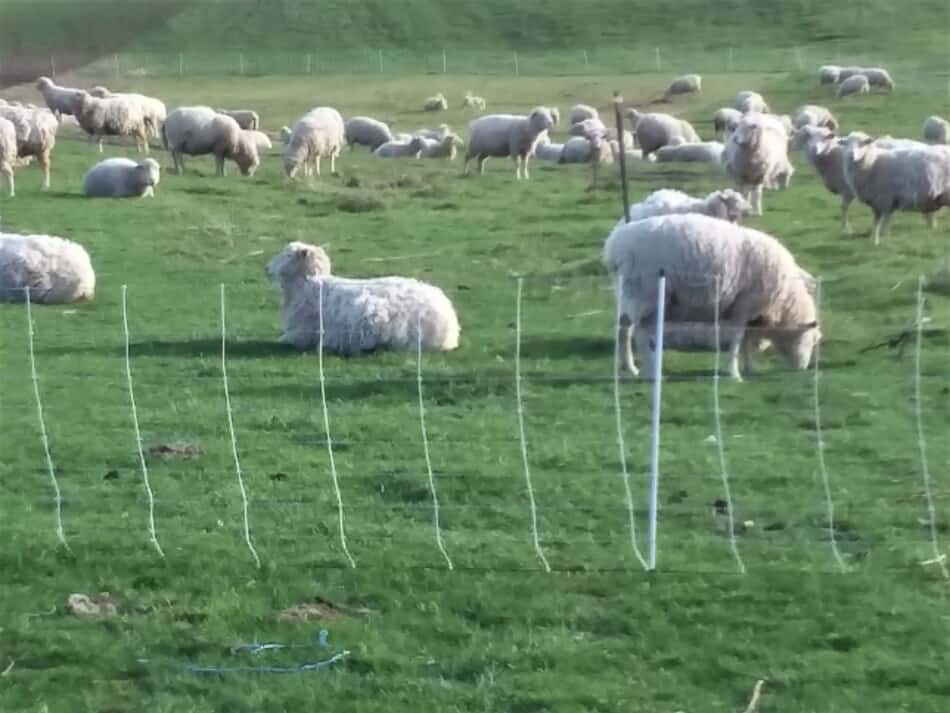
Sheep eat grass and grow well
Sheep eat grass and grow well, how simple is that? Not all animals can grow well on grass alone, but sheep are custom made for grass eating and performing well as a result.
We have a flock of around 200 ewes that we raise on grass only through out the year and then hay and haylage in the winter.
Our flock will lamb out on pasture in May, then be rotated around the rest of the farm for the grazing season. Moms and babies stay together out on pasture, as long as we have the grass to feed them, and seem to grow well.
We provide water and a salt block and that’s it, the sheep do the rest on the grass and other plants growing out in the fields.
I do have to point out that when I write about sheep that grow well on grass, I am referring to “working” or production sheep, meaning sheep that have to produce to stay, not pets or show sheep.
Nothing wrong with pets or show lines, just mentioning that some of these non commercial sheep need more dietary support, like grain, to grow well because of their genetics.
If you want to raise grass only sheep, get them from a grass only flock. Read How To Select A Grass Fed Flock for a more in-depth look at finding your grass based starter flock.
Another thing you may not have considered about sheep eating grass is how much grass you have in hard to reach places, I’m talking about the spots you avoid mowing because it’s steep, too tight, etc. Sheep can eat that!
We move the sheep all over the farm, around the buildings and house, too, to let them eat off the grass growth. We use electric netting and can put the sheep in all kinds of oddly shaped or out of the way areas that have grass.
You’d be amazed at how well they can knock back some overgrown areas, which is less work for us and the string trimmer!
The sheep will also eat off weeds, which to me aren’t really weeds if the sheep are eating them! Before you mow off an area, put your sheep in there and see what they can do.
Sheep are small and large farm friendly
Sheep are great for folks with smaller amounts of land, like a good sized yard, as well as folks with plentiful acreage. If you have grass, or other sheep friendly forages on your land, your sheep will be happy to eat it for you!
The only difference between having sheep on a large scale and having sheep on a smaller scale is:
- the size of the flock (of course!)
- the set up needed to make care and chores go smoothly
- ability to spread cost of improvements over more sheep
Flock size is based on area available and forage growth
Really, more sheep is just a matter of math.
If you can have 5 sheep per acre and you have 8 acres that you are willing to use for sheep, then you can have up to 40 sheep. If you have 2 acres, then you can have 10 sheep. If you are willing to feed hay, you can have more.
Larger flocks will have more convenient facilities set up to work the sheep
A farm or ranch with more sheep will find it more worth while to have dedicated sheep working areas set up, for routine care and sorting.
A small flock is likely to use cattle panels and make what they have work, which is fine and what we did for years!
Larger flocks can spread improvement costs over more sheep
This is a definite large flock advantage, they can spend more on improvements, like a really great ram, and spread the cost out over more lambs, than a small flock can.
This also relates to the above section about facilities, improvements make money sense sooner with a larger flock.
Sheep are fairly easy to fence
Sheep are pretty easy to fence. I wrote “pretty easy” and not just easy, because there is a bit of a catch with sheep and fence.
The fence doesn’t have to be “cattle tough” (cattle lean, push, rub, etc.) but it must be solid looking to the sheep. We use electric netting and woven wire for our flock.
We also have sections around the garden that are 2×4 welded wire (a garden or rabbit type fence), that works fine, too. Cattle or horses, just because they are taller, would mash this fence down but the sheep stay in.
Greg Judy has sheep trained to a single strand of electric wire, this is awesome and unusual. Unless you bought your sheep from him, or someone else doing single strand with sheep, don’t count on one strand keeping in your flock.
Most folks fencing sheep would need 3 or more strands to keep in their flock, ours need netting. Compare that to cattle that need one strand of wire (for division fences) or 3 strands for perimeter. This is why I put “fairly easy”.
Sheep need little to no specialized equipment to raise them
Sheep really don’t need much in the way of specialized equipment, like special feeders or waterers, to be happy and healthy.
Sure, you’ll need a few gates and some buckets, but those are normal items that are easy to find at any farm or feed store. We use regular water troughs, the short sided 60 gallon type and, aside from fencing, that’s it for the main flock.
When we bring lambs inside after weaning, which you can keep lambs with the ewes if you want (as long as the ram lambs are castrated), we use hay feeders.
We also deworm the lambs twice per summer, with a automatic dewormer set up you can buy when you get the dewormer or just a big dosing/drenching syringe. (This is what we used for quite a few years.)
Other than that, we don’t have much sheep specific stuff, all of our sheep areas could be used for other livestock just as easily.
Sheep are adaptable to most areas
Sheep are adaptable to most areas, especially areas that are colder in the winter or tend to have wetter summers. As long as your area has grass for them to eat, there are sheep that will work for you.
Keep in mind you will need to select a flock from a person in your area, all areas have specific advantages and challenges, so get sheep that have been selected to perform where you are!
For instance, if I was a beginner and wanted to get started with sheep, I would do better with sheep from around here rather than sheep from across the country, since the sheep around here are used to the conditions where I live.
Sheep are smaller bodied livestock
Sheep are a smaller animal, making them easier to handle and transport than larger livestock, like cattle. This smaller size makes sheep more of a family or small acreage friendly animal to raise.
As mentioned above, sheep are also eat less per animal and are less hard on fences and equipment, both of which are directly related to being smaller animals.
Sheep also have a lighter weight, so do less damage to grass in less than idea weather conditions. Sheep can still damage a sod, but it will be less damage than that of a heavier animal. This is directly related to lower body weight.
Sheep are not overly friendly
While this may seem like an odd thing to say, it’s not, and here’s why: sheep are happy to do their thing and don’t need or want much “hand holding” from you.
This is great! This means your sheep, once you have them set up with a comfortable place to live can be happily eating and growing on their own, while you spend your time with something else, they don’t need a nanny!
Don’t get me wrong, I like spending time with the sheep, but I also like to do other things with my day, like hang out with the grandkids or take my dogs for a walk.
Sheep are profitable
Finally, sheep are profitable, right now one of the more profitable animals to raise.
While this may be the first thing you were interested in sheep for, I listed it last because if you don’t like the sheep, making them profitable is tough.
However, if you enjoy sheep and are willing to put in a few years “to learn the ropes”, you’ll be pleasantly surprised at how well even a small flock can do for you as a business.
Raising Sheep For Profit is an article I wrote to give you an overview of where you get money and where you spend it if you are raising sheep. Check it out if you are looking into sheep as a business.
As of this writing, we are selling 80-100 pound market lambs for $225-250 each. That’s way up from just a few years ago, we used to budget for more like $150.
If you can keep your costs down, especially feed costs, sheep can make you a nice little profit.
Raising Sheep Has Some Cons
Here’s an article I wrote all about it, 7 Disadvantages Of Raising Sheep, if you want a more in depth look. Here are a few of the not so great things about sheep that you should know about.
Sheep naturally run from you
Despite what you may read otherwise, most sheep are not overly friendly. I’m not saying they are mean, they are just not pets. Think of them more like the cat that wants food, but does not like to be petted.
The natural reaction of sheep for nearly any situation is to run, even if it makes no sense or you are their normal care taker. Doesn’t matter, they still like to keep a bit of distance from you and will skitter away if you get too close.
I have to admit, this can be annoying, especially if you are trying to catch a sheep to help it! Running away from change is how sheep have survived for ages, it’s hardwired in.
If you need to be able to pet your animals, sheep may not be the best choice for you.
Sheep are small bodied
I know, I know, I just listed small bodied in the pros section, but here’s why small bodied is listed as a con, as well: less meat per market animal.
This will become more apparent if you are selling custom lamb or are getting a lamb butchered for yourself.
At least around here, the slaughter charge for a lamb is a flat fee of $100. That’s for 32.5 pounds of meat, if you take in a 100 pound market lamb.
In case you haven’t done the math, that’s $3.07 per pound of meat in processing fees, alone. If you get more boneless cuts, you’ll be closer to 25 pounds of meat, which is $4.00 in processing fees per pound of meat.
If you want to look more into the cost of raising sheep for your freezer, read Is Raising Lambs For Meat Worth It?
This is definitely a downside of sheep. As far as all of the major livestock goes (cattle, chickens, pigs) sheep (and, to be fair, goats) have high processing fees per pound of meat you put in your freezer.
Sheep are susceptible to worms and other parasites
The biggest downfall of sheep is parasites, they can become rampant if not managed and treated appropriately. Parasites can easily kill sheep, especially lambs.
Even if the heavily infested sheep are looking okay right now, they are being drug down by a heavy parasite load that steals their nutrients, which is at best, losing you money by feeding them and not getting results.
At worst, it’s killing sheep, especially lambs, and putting you out of business, fast.
If that sounds harsh, please understand that some sheep can have a significant parasite load and still keep on trucking for a short while, it’ll catch up to them.
So, you are just feeding them like crazy and wondering why the extra feed isn’t helping. It’s because you are feeding the worms, not the sheep!
Sheep need more of a fence than cattle
Sheep are a bit more complicated to fence in than cattle. A single strand of electric won’t do it for most sheep, which can be frustrating when you are the one putting up and moving fence!
The place where this will get you is when you are grazing multiple species together. You need to have the fence suited for the hardest to fence animal of the group.
For example, if you are grazing cattle and sheep together, a wonderful idea to break the parasite cycle, you’ll need to have a fence that will keep in both, not just the cattle.
We buy our netting from Premier 1, check them out for fencing options and charts. They have a lot of options and walk you through choosing what will work for you. (not an affiliate link, just useful information)
Sheep seem to hide problems
Sheep are great at hiding problems until the problem is too much or too advanced for them to keep putting up the effort. This is where your skill as a manager and observer becomes critical.
The sheep “that just showed up dead” is unlikely, possible, but unlikely. That sheep was showing subtle signs of being “not quite right” for a day or so before it died. (Bloat is the exception here, it can happen in hours, not days.)
So, how do you deal with this? Easy, if you notice something isn’t right, catch the sheep and see what’s what. We have saved quite a few sheep from death merely due to watching them and grabbing them when we first see a problem.
Sheep are easy targets for predation
Sheep can be an easy target for predators, especially lambs at lambing. While predation pressures vary with your area, if you have coyotes, fox, eagle, bear, bobcat, and so on, you have predation potential.
For us, with the electric netting being used on the sheep, we seem to have minimal predation, this year none that I know of. In areas with significant predation, guard dogs or bringing in the sheep at night will be needed.
Sheep vets are not common, especially in the U.S.
Veterinarians tend to not have much sheep (or goat) experience or training. This is not a complaint about veterinarians. Vets are caring people who can only do and know so much.
The vets learn more about cattle and pigs and have more cattle and pig clients, so they have more experience with cattle and pigs and little to no experience with sheep.
On the plus side, with the increasing interest in small ruminants (sheep and goats) there is a increase in the veterinary knowledge base about sheep, but it’s still incomplete compared to other more popular livestock.
Maryland Small Ruminant Page seems to be working on spreading sheep and goat information, so the information is coming, but not well distributed yet.
